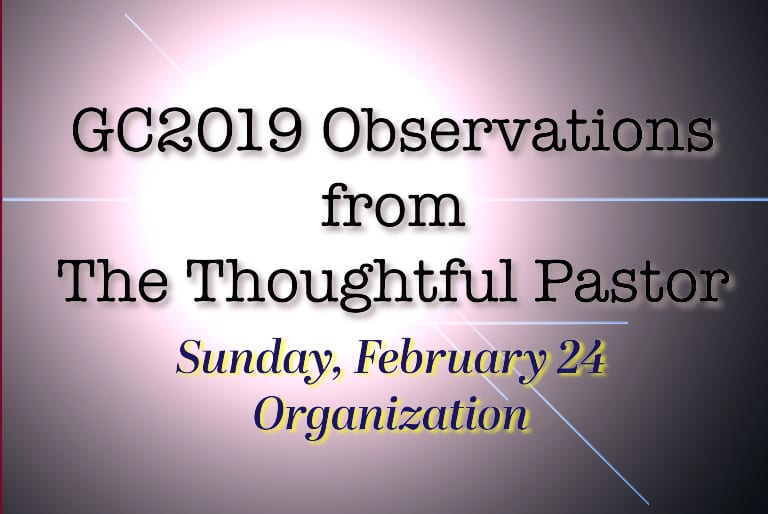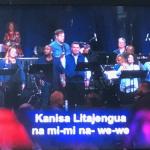The words of Bishop Carter and his passionate call for unity ring in my mind. May they do so in the minds of these 864 people, whose hard work now awaits them. But I’m worried.
 Sunday morning: Worship started at 7:30 am. I was a bit late getting to the press box, but most others are late getting in at all as the lines to enter the dome are hundreds of people long–and it’s pretty cold out there. At least it is not raining today.
Sunday morning: Worship started at 7:30 am. I was a bit late getting to the press box, but most others are late getting in at all as the lines to enter the dome are hundreds of people long–and it’s pretty cold out there. At least it is not raining today.
Complaints continue about the inadequate press situation. My colleague, Cynthia Astle, has summed it up well here.
I was describing it to a couple of observers over a hasty breakfast this morning. Their response: the conference organizers appear to want the press to keep its distance both physically and metaphorically.
In other words, let us do everything possible to keep people from knowing how the sausage is made.
But I made it in time to hear the message by Kenneth Carter, Jr., President of the Council of Bishops. I feel sure it will be available through United Methodist Communications eventually.
If I find a video of it, I will insert it later.
For now, be satisfied with this summary:
Bishop Carter reminded us that we all came to this conference loaded with both our physical luggage and our stories. Our stories of love, of pain, of encounters with Christ, of the opportunities God made possible in The United Methodist Church. But it’s important to remember the danger in a single story. We are here, in a place of privilege, to share our stories and to listen to the stories of others.
Remember: the good news is that God has a story, too. It’s a story of divided peoples, to include what we have excluded, to make clean what we have called profane, to salvage what we have discarded. It’s a creation story.
Our story may be to divide or destroy, but God’s story is about creation, about breaking down the dividing walls of hostility between us. We come to this in our divisions. Our languages divide us. Our life experiences and our opinions divide us.
Over the last three years, Bishop Carter was asked by the church to watch and listen for the good by the conservatives, the centrists, the progressive, to see the work of the Holy Spirit in them, to assume the best about them, about each person here. He learned to watch and listen for the faith just underneath the service, the motivation to be United Methodists.
Look at your hands!
Now, the missions of the progressives, the centrist, the conservative, is in the hands of the delegates. He called out: “Look at your hands. If you watch and listen for the good in all of us, you will see it.”
Carter contended that as we look, we will see people living this prayer, “kindle in us the fire of love.” We will see people loving people who do not love them back.
For now, we gather in submission to the cross and the flame. All have professed faith in Jesus Christ as Lord and Savior. So we will pray for the gift of the Holy Spirit to make us one with Christ, one with each other, and one in ministry to all the world. Where you see the mission of God, you see people connected to each other.
Carter reminded us that divisions are easy to see, but it is harder to see the connections. What connects us, however, is God’s story, not ours. Carter then summarized the life and ministry of Paul, how he inserted his story in all his letters.
The New Testament church united for the mission. God through Jesus Christ shows us the way of peace through our divisions and our binaries. Are we bold to believe that God can do this again?
Think of our lives, what God has made possible, offering a way when there seemed to be no way. My story is God’s creation. Yes, there are dividing walls everywhere. We come divided. Could these be three days where Jesus might resurrect us and raise us to a new life and reconcile our groups and all our associated tribes into one body?
 Could it be that Jesus Christ has already done this when he broke down the dividing walls of hostility by the work on the cross?
Could it be that Jesus Christ has already done this when he broke down the dividing walls of hostility by the work on the cross?
The Bishop then offered a passionate call for unity, for remembering again the work of Christ. We must allow our story to become a part of God’s greater story–but we don’t suppress our story in the process. We also do no harm.
We will tell this to the world: we love each other because God first loved us. We will make every effort to maintain the unity of the spirit in the bond of peace.
Carter called us to ponder the Rule of Taize: “Never resign yourself to the scandal of the separation of Christians who so readily profess love for their neighbor and yet remain divided. Make the unity of the body of Christ your passionate concern.”
A series of uncomfortable questions
At this point, Bishop Carter offered a series of uncomfortable questions. Here are some of them:
-
Have we made every effort?
-
Can we alllow our stories to become a part of the much bigger story?
-
What if we imagine that this means more to God than it does to us?
-
What if in our life together we became an outward and visible sign of the cross and the flame?
-
What if we seek both a robust evangelical orthodoxy and a radical welcome?
-
What if we admitted that when we speak of holiness, the world hears judgment?
-
What if holiness is in experiencing in these three days an encounter with the God of Isaiah 6 in a small circle of trust with each other, like band meetings, class meetings, Christian conferencing?
-
What if schism is never God’s dream for the church?
-
What if searching for the exits is easier but less faithful?
-
What if there is a deep center, a great tradition worth claiming?
-
What if we were to empty ourselves of all but love?
-
What if we make every effort to maintain the unity of the spirit in the bonds of peace.?
-
What if we make the unity of the body of Christ the passionate concern?
Bishop Carter finished his compelling message by quoting the great Zan Holmes: “No sermon should end without two things happening. One, we should give God the credit. And so, as we find a way forward, we will give God the glory. Two, without there being some good news. Hear the good news here: What God has promised, God is able to perform. God is Able.
A Passionate Call For Unity
Wow, what a sermon!–that’s my summary. Bishop Carter made it plain: those who want to divide the UMC are operating outside the clear will of God.
A couple of times during his call to unity the delegates broke into applause. However, again from this difficult vantage point with sound traveling poorly from the floor to the press box, I could not see how well those words were being received across the whole of the delegates.
Last night, I reviewed again the plans before the General Conference. Two, both endorsed by the Commission on a Way Forward, preserve the unity of the church. Those are the One Church Plan and the Connectional Conference Plan. They are both complicated, but doable.
The third, now called The Modified Traditional Plan, does not preserve that unity and was not included in the original report by The Way Forward commission.
This plan calls for people who disagree with the choice to keep the language singling out the practice of homosexuality as incompatible with Christian teaching firmly in the Book of Discipline to leave the UMC.
While there are many actions that could be deemed incompatible with Christian teaching, it is telling that this is the only one mentioned in the Book of Discipline. For the reason alone, is clearly problematic. But those supporting the Traditional option aim to enact formal censure and expulsion from The United Methodist Church anyone who cannot sign on to that statement. Essentially, the Modified Traditional plan calls for schism.
The fourth plan, The Simple Plan, removes all language that singles out the practice of homosexuality as unacceptable and returns the Discipline to its pre-1972 wording. At the 1972 General Conference, a group of conservative delegates, in a last-minute and poorly-debated piece of legislation, inserted those phrases. The Simple Plan also preserves unity, but it was not written or endorsed by The Way Forward.
Decision quality impaired
Shortly, the delegates will reconvene and start the business of the day. Using a “vote up/vote down” process, delegates will decide the order of the petitions to be presented tomorrow.
From my understanding, here’s where the major politicking begins: like it or not, this order matters and matters greatly. Human nature being what it is, the later in the day something is debated, the likelier it is that the debate will be lower in quality and to be negative in tone.
Delegates have exactly one day, perhaps six hours of actual debate time, to consider 76 pieces of legislation tomorrow. Two pieces of legislation, part of the Modified Traditional Plan, were ruled unconstitutional yesterday by the Judicial Council.
With that ruling coming out late yesterday, it is likely that last night saw a lot of late-night meetings to rethink the strategy on the part of the traditionalist, further lowering the ability of people to make high-quality decisions.
Yeah, I’m worried. But the words of Bishop Carter and his passionate call for unity ring in my mind. May they do so in the minds of these 864 people, whose hard work now awaits them.
Photo Credits: Christy Thomas and free photos from Visual Hunt.













